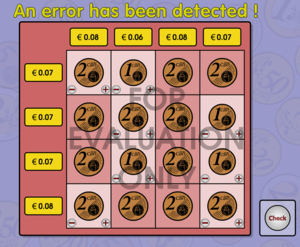Learning Path
Exploring Money with 3rd & 4th classes Learning Path
By PDST
This learning path, suitable for 3rd & 4th classes, supports the exploration of money through a series of challenges, tasks and activities.
5 resources in this Learning Path
Coins Game
https://www.topmarks.co.uk/money/coins-game Added: 17 Mar 2020 Contributor: Deirdre Cushen Resource type: SimulationThere are 3 game modes - sorting, ordering and counting. The first activity, Sorting, helps children to recognise the different coins. The second, Ordering, involves arranging the coins from lowest to highest values. Thirdly, the Counting game has eight different ability levels where children count the amounts of money on a piggy bank.
View full descriptionHow it maps to the curriculum
- 1-2
- Mathematics
Strand: Measures
Strand unit: Money
Content objective: This resource should enable a child to:
- recognise, exchange and use coins up to the value of €2
Least Number of coins
https://ie.ixl.com/math/class-2/least-number-of-coins Added: 17 Mar 2020 Contributor: Deirdre Cushen Resource type: SimulationCalculate various amounts using the least number of coins
View full descriptionHow it maps to the curriculum
- 1-2
- Mathematics
Strand: Measures
Strand unit: Money
Content objective: This resource should enable a child to:
- recognise, exchange and use coins up to the value of €2
Coin Breaker-An Interactive Game That Can Suit Many Ability Levels.
http://www.teachingmoney.co.uk/eurosite/games/coinbreakerEURO.html Added: 12 Jul 2016 Contributor: Orla Galligan Resource type: Game / ToolEach game can be amended to suit higher, lower and middle ability levels. Pupils have to chose 4 different amounts of money to make the total amount.
View full descriptionHow it maps to the curriculum
- 3-4
- Mathematics
Strand: Measures
Strand unit: Money
Content objective: This resource should enable a child to:
- solve and complete one-step problems and tasks involving the addition and subtraction of money
Suggestions for use: Use the interactive in pairs or as a class to explore the value of money. Adjust the difficulty depending on your class.
- LCA
- Mathematical Applications
Strand: Module 1 - Mathematics for Living
Strand unit: 5. House & Home Mathematics
Suggestions for use: LCA Maths: Use the interactive game with your LCA class as a starter to your lesson so that pupils learn to appreciate the fun puzzle side to their maths lessons.
Maths eyes: Peggy Goes Shopping
https://www.scoilnet.ieuploads/resources/31951/31693.pdf Added: 23 Mar 2020 Contributor: Mairead Holden Resource type: ActivityHow important is a decimal point? In this short story "Peggy goes shopping", we learn about the importance of place value and number sense.
View full descriptionHow it maps to the curriculum
- 3-4
- Mathematics
Strand: Measures
Strand unit: Money
Content objective: This resource should enable a child to:
- rename amounts of euro or cents and record using symbols and decimal point
- rename amounts of money as euro or cents and record using e symbol and decimal point
- solve and complete one-step problems and tasks involving the addition and subtraction of money
- solve and complete practical one-step and two-step problems and tasks involving the addition, subtraction, multiplication and simple division of money
Suggestions for use: Children should be encouraged to read and discuss this short story in order to make sense of where the decimal point is missing.
Measures Handbook - PDST Numeracy
https://www.scoilnet.ieuploads/resources/19602/19325.pdf Added: 24 Oct 2016 Contributor: Scoilnet Resource type:This manual has been designed by members of the Professional Development Service for Teachers. The aim of this Teacher’s Handbook is to assist teachers in teaching the strand of Measures (infants to 6th
class). This comprises the Strand Units of Length, Area, Weight, Capacity, Time and Money. This resource is
intended to complement and support the implementation of the Primary School Mathematics Curriculum
(PSMC) rather than replace it.
How it maps to the curriculum
Strand: Useful Websites
Suggestions for use: Teachers should use the handbook as an instructional framework advocating methods of eliciting, supporting and extending higher-order mathematics skills such as reasoning; communicating and expressing; integrating and connecting; and applying and problem solving
Strand: Useful Websites
Suggestions for use: Teachers should use the handbook as an instructional framework advocating methods of eliciting, supporting and extending higher-order mathematics skills such as reasoning; communicating and expressing; integrating and connecting; and applying and problem solving
Strand: Useful Websites
Suggestions for use: Teachers should use the handbook as an instructional framework advocating methods of eliciting, supporting and extending higher-order mathematics skills such as reasoning; communicating and expressing; integrating and connecting; and applying and problem solving
Strand: Useful Websites
Suggestions for use: Teachers should use the handbook as an instructional framework advocating methods of eliciting, supporting and extending higher-order mathematics skills such as reasoning; communicating and expressing; integrating and connecting; and applying and problem solving


